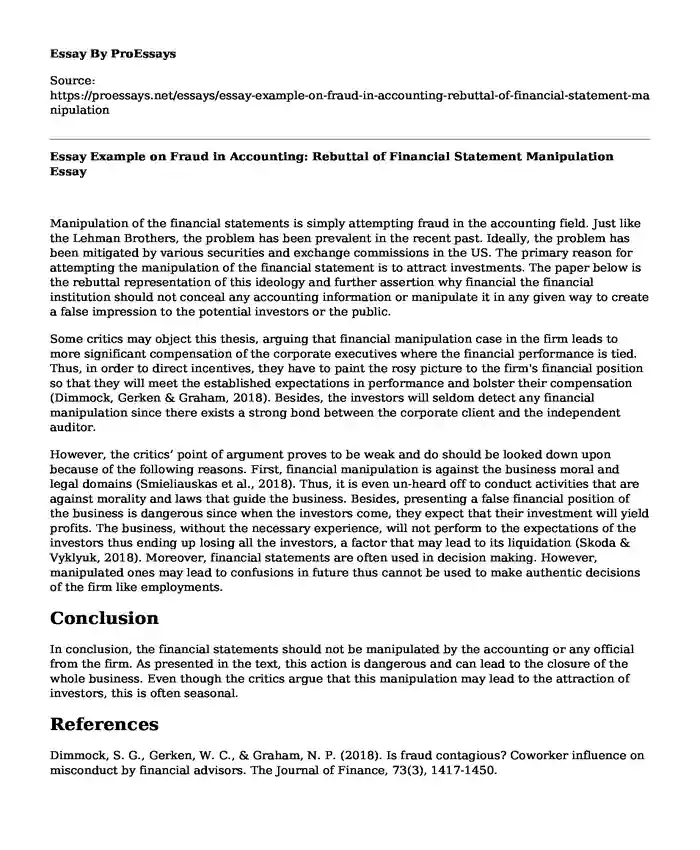Manipulation of the financial statements is simply attempting fraud in the accounting field. Just like the Lehman Brothers, the problem has been prevalent in the recent past. Ideally, the problem has been mitigated by various securities and exchange commissions in the US. The primary reason for attempting the manipulation of the financial statement is to attract investments. The paper below is the rebuttal representation of this ideology and further assertion why financial the financial institution should not conceal any accounting information or manipulate it in any given way to create a false impression to the potential investors or the public.
Some critics may object this thesis, arguing that financial manipulation case in the firm leads to more significant compensation of the corporate executives where the financial performance is tied. Thus, in order to direct incentives, they have to paint the rosy picture to the firm's financial position so that they will meet the established expectations in performance and bolster their compensation (Dimmock, Gerken & Graham, 2018). Besides, the investors will seldom detect any financial manipulation since there exists a strong bond between the corporate client and the independent auditor.
However, the critics’ point of argument proves to be weak and do should be looked down upon because of the following reasons. First, financial manipulation is against the business moral and legal domains (Smieliauskas et al., 2018). Thus, it is even un-heard off to conduct activities that are against morality and laws that guide the business. Besides, presenting a false financial position of the business is dangerous since when the investors come, they expect that their investment will yield profits. The business, without the necessary experience, will not perform to the expectations of the investors thus ending up losing all the investors, a factor that may lead to its liquidation (Skoda & Vyklyuk, 2018). Moreover, financial statements are often used in decision making. However, manipulated ones may lead to confusions in future thus cannot be used to make authentic decisions of the firm like employments.
Conclusion
In conclusion, the financial statements should not be manipulated by the accounting or any official from the firm. As presented in the text, this action is dangerous and can lead to the closure of the whole business. Even though the critics argue that this manipulation may lead to the attraction of investors, this is often seasonal.
References
Dimmock, S. G., Gerken, W. C., & Graham, N. P. (2018). Is fraud contagious? Coworker influence on misconduct by financial advisors. The Journal of Finance, 73(3), 1417-1450.
Skoda, M., & Vyklyuk, Y. (2018). Detecting creative accounting practices and their impact on the quality of accounting information. Zbirnik naukovix prac [Bukovinskogo universitetu]. Ekonomicni nauki, (14), 59-72.
Smieliauskas, W., Bewley, K., Gronewold, U., & Menzefricke, U. (2018). Misleading Forecasts in Accounting Estimates: A Form of Ethical Blindness in Accounting Standards?. Journal of Business Ethics, 152(2), 437-457.
Cite this page
Essay Example on Fraud in Accounting: Rebuttal of Financial Statement Manipulation. (2023, Oct 04). Retrieved from https://proessays.net/essays/essay-example-on-fraud-in-accounting-rebuttal-of-financial-statement-manipulation
If you are the original author of this essay and no longer wish to have it published on the ProEssays website, please click below to request its removal:
- Report Example on the Best Western Group of Hotels
- Paper Example on NYS Ethics Enforcement
- Essay Example on Funding Health Care With Tax Money: A Global Perspective
- Essay on Global Expansion of Business: Benefits of Universal Accounting Standards
- Essay on the Benefits of International Business: Understanding & Shaping Your Career
- Essay on Planning Your Future: Leverage Design Thinking, Entrepreneurship, & Innovation to Shape Your Career
- Essay on European Sovereign Debt Crisis: Financial Crisis of 2007-2008.







